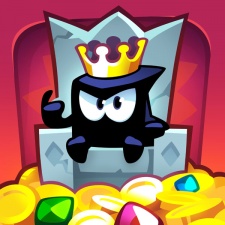Welcome back to The In-App Purchase Inspector - our regular look at free-to-play games from the consumer's perspective.
In each installment, we'll be looking at the incentives or pressure applied to make in-app purchases, their perceived value, the expansion offered by IAPs and the overall value of the experience.
The end goal will be to see whether the game makes a good enough case for us to part with our cash, or whether players are content - or engaged enough - to 'freeload'.
This time, we'll be taking a look at ZeptoLab's vibrant online robbery game King of Thieves.
The first heist
ZeptoLab is best known for its wildly popular Cut the Rope series, which has players solving fiendish puzzles in order to feed sweets to a cuddly monster.
King of Thieves, the studio's latest, is a very different game - an auto-running 2D platformer crossed with Dungeon Keeper-esque lair management and trap-laying, in which players from all over the world attempt to rob each other blind - but it maintains the same cartoony charm.
And, just like Cut the Rope, it's an admirable showcase of ZeptoLab's game design smarts.
The one-touch platforming makes it accessible to raid other player's lairs and to run through the game's single player levels, but there's a certain depth involved in designing a base that will have would-be thieves tearing their hair out.
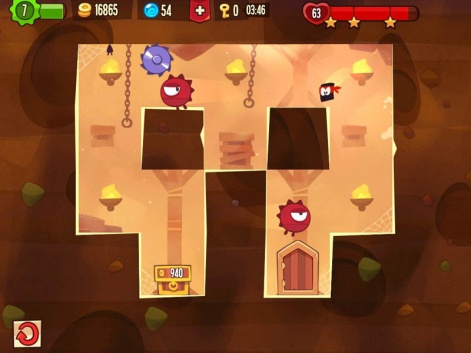
There's great pleasure in seeing one of your well-laid traps finding its victim, and King of Thieves understands this well.
There's great pleasure in seeing one of your well-laid traps finding its victim.
The game alerts you every time a player attempts a robbery on your dungeon, with replays allowing you a self-satisfied chuckle as you see them fall victim to your craftily-designed network of jagged edges and patrolling beasts.
So many free-to-play games struggle with long-term appeal, but it's in the simple joy of getting one over on other players that King of Thieves has wormed its way into my daily routine.
Stealing your time
There's a lot to do in King of Thieves. First there's a fairly hefty clutch of single player levels, which play out like pretty much any other mobile auto-runner, complete with a three star scoring system.
Hopping your way through these is fun enough, but the real meat of the game is stealing the gold and gems of other players.
This is also ranked on a three-star scale, with your performance directly correlating with the amount of loot you manage to take off with.
This is where the all-important dungeon design comes in, a simple interface which has you dragging elements around the screen - be they buzzsaw blades, cannons, or flying guard-beasts - to protect your treasured gold and gems.
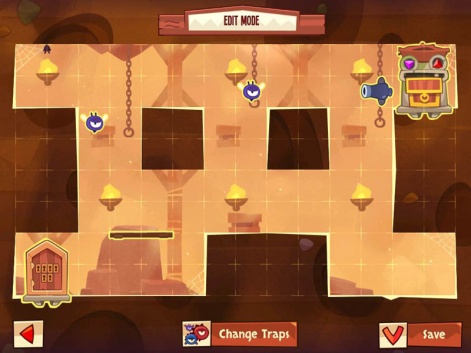
Gold is a pretty throwaway currency, being pretty generously ladled out as a reward for completing missions, thwarting intruders with traps, and generally accumulated in your dungeon's gold mine, but it's the gems you really don't want to get stolen.
The total sum of your gems serves as your overall score, which dictates your position in a league against those of a similar level.
Combining two or more gems together in your dungeon's totem-like monument spawns one of greater value.
The monetisation element which borders on the contentious are the lockpicks
However, this process takes time to carry out, in which time the evolving gems in question are at risk from the thieving mitts of other players.
Stealing your money?
There's a hard currency in the game, which can be used for all the things you'd expect - skipping wait timers to minimise the chance of theft, upgrading dungeon defences, and buying additional gem slots - but that's all par for the course.
The cost of the hard currency isn't too outrageous either, ranging from $2.99 (£1.99) for 100 of these blue orbs to $49.99 (£39.99) for 4,000. And it's fairly readily handed out, too, for things like meeting league milestones.
However, the element of King of Thieves' monetisation which borders on the contentious is the pseudo-energy system, which here manifests itself as lockpicks.
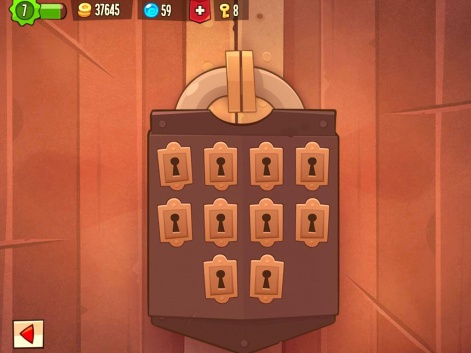
As part of their dungeon defence plan, players are able to increase the number of locks - only one of which actually grants entry to their lair, the rest acting as decoys. Each one takes a single lockpick to unlock.
This means that, depending on nothing other than dumb luck, the same door could cost you either a single lockpick or six. It becomes a literal guessing game, a game of chance, a gamble.
And, unless it's explicitly a betting app, the word 'gamble' is not one I enjoy being associated with free-to-play gaming. However, I understand that the gambling or 'gacha' mechanic is very popular in places like Japan, which is obviously where ZeptoLab has found its inspiration in this respect.
Nevertheless, while your lockpicks restore automatically over time, this system can feel quite unfair and limiting.
If you find yourself running out of lockpicks - and, trust me, you will - you can either shell out 9 orbs to completely restore them or you can watch a short advertisement in return for two free lockpicks.
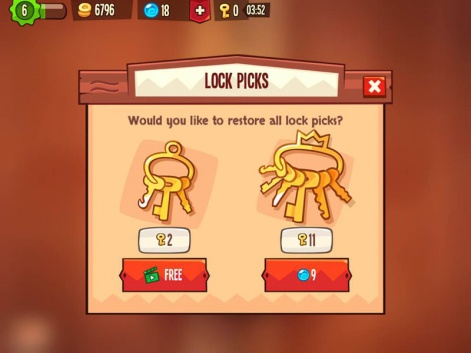
While 9 orbs is of very little value in terms of real money, and minute-long adverts are hardly worth grumbling over, it can feel like the flow of game is being compromised by these monetary pressures.
However, it is good that ZeptoLab has at least included incentivised advertising as an option for those players who are tight-fisted with their in-game currency, and ensured that there is a way through that doesn't involve spend.
More gacha
Unfortunately, though, that isn't the only example of King of Thieves reducing its gameplay to a roll of the dice.
The other notable example is that, when you rob another player's dungeon, the outcome of a spinning wheel dictates whether or not you get to rob a gem.
This is partially based on your performance, so you'll have a much greater chance of winning after a three-star completion rating than if you'd only managed one star, but even at best the odds seem to peak at 50/50.
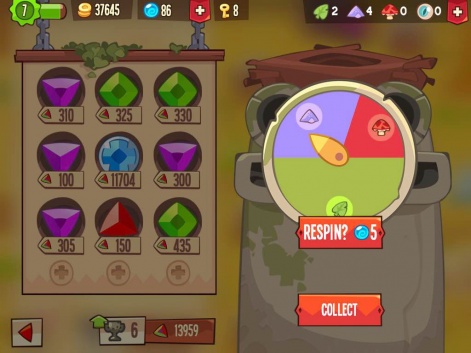
Worse still, you're given the option to spin again if you fail, at the cost of a few orbs. And then again, but this time the cost has doubled.
And so on until, just like in a casino, you either cut your losses or keep paying out until you see a reward.
Red-handed
It's clear some aspects of the monetisation in King of Thieves don't sit well with me, but it is a testament to the game itself that I have kept playing.
And I have spent money, too, opting for 300 orbs priced at $4.99 (£3.99) and mostly using them to hurry along lengthy rituals.
I've also patiently sat through many adverts in return for lockpicks, and I can see this double-threat of IAPs and in-game ads being a lucrative one for ZeptoLab.
King of Thieves is an undeniably strong game, and one you'll be happy to keep on playing, but the heavy focus on luck - and particularly the monetisation approaches that are adopted to go hand-in-hand with this - may sour the experience for some.

